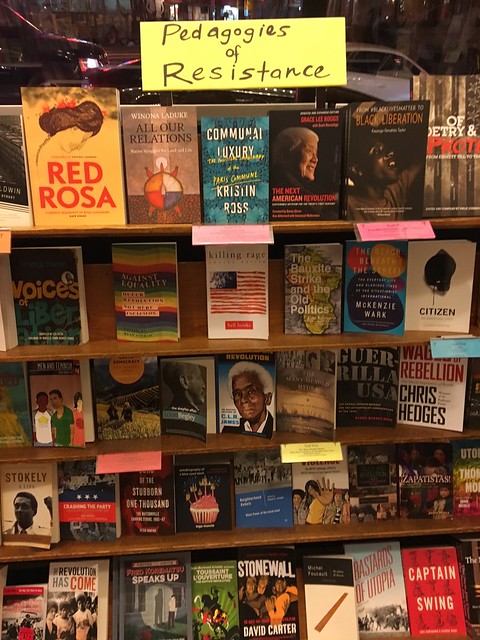You Can’t Read That! is a periodic post featuring banned book news and reviews.

YCRT! News
A Texas congressman says “Better to get your news directly from the president. In fact, it might be the only way to get the unvarnished truth.” A San Antonio PBS talk show host records a rebuttal but the station CEO pulls it, citing fears of retribution through cuts to federal funding. Turns out the CEO has ties to the congressman. Although the rebuttal eventually airs, self-censorship by public media is a huge concern under the current administration.
At last, a new Philip Pullman trilogy is in the works (I’ve already pre-ordered the first book, due out in October). Pullman’s infamous His Dark Materials trilogy consistently ranks high on the American Library Association’s annual list of banned & challenged books.
“At Colby College, a student was reported for saying ‘on the other hand,’ which was perceived as ableist by another student.” This has to be The Onion, right? Sadly, no.
The hyperbolic headline says “Read these 10 Books Before They’re Banned in the U.S.” Well, no, but they’re certainly the kind of books that will be challenged, should any high school teacher dare to assign them.
Diversity posters have been taken down by Maryland school administers because, apparently, celebrating diversity is an anti-Trump political stance. It probably didn’t help that the artist, Shephard Fairey, created the Obama “Hope” poster from 2008.
Alice Walker’s “The Color Purple,” Toni Morrison’s “The Bluest Eye,” Khaled Hosseini’s “The Kite Runner,” J.D. Salinger’s “Catcher in the Rye,” and Sherman Alexie’s “The Absolutely True Diary of a Part-Time Indian” have been removed from a Nome, Alaska high school substitute reading list after a group of parents complained about “large amounts of profanity, sex, violence, abuse, rape, and incest.” As if any of these parents have actually read these books, and not gotten their information from Christianist book-banning sites.
Google alerts me to stories of book challenges and bannings. These links often lead to religious and anti-abortion sites complaining about libraries refusing to stock religious, racist, and anti-semitic tracts. Such organizations call their pamphlets literature in order to make specious claims about “liberal book-banning.” Sometimes, though, claims are more nuanced: in this case, a university library pulling a biography of Winston Churchill from public display because the author is a Holocaust denier.
When young adult books with racially and sexually diverse characters are assigned as student reading, parental challenges are sure to follow. But if you want to publish a truly subversive novel, have a main character who’s fat.
Speaking of diversity in YA literature, here’s an author who went along with a request to self-censor a talk to students and wishes she hadn’t. I wish she hadn’t, too.
You can bet I clicked on this story: Florida Fire Started by Book Burning Destroys at Least 10 Homes.
Uh oh. “Much like Virginia, the state of Florida now has its own set of ‘zombie bills’ that have returned to the legislature for the second year running, in an attempt to weaken education standards and allow any taxpayer—not just parents—to raise objections to instructional materials.”
Shortly after historian Howard Zinn’s death in 2010, Indiana Governor Mitch Daniels wrote: “This terrible anti-American academic has finally passed away. The obits and commentaries mentioned his book ‘A People’s History of the United States’ is the ‘textbook of choice in high schools and colleges around the country.’ It is a truly execrable, anti-factual piece of disinformation that misstates American history on every page. Can someone assure me that it is not in use anywhere in Indiana? If it is, how do we get rid of it before more young people are force-fed a totally false version of our history?”
Now it is 2017, and an Arkansas state legislator has introduced a bill to “halt the use of any book or other material authored by Zinn between the years of 1959 and 2010 in public schools and open-enrollment public charter schools.”